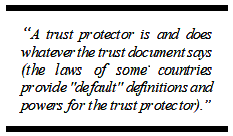WHO SHOULD BE THE TRUST PROTECTOR OF YOUR ASSET PROTECTION TRUST? IT REALLY DOES MATTER!
2019 – OUR 27th YEAR OF PUBLICATION!
Volume XXVI • Number 2 • June 2019
INTRODUCTION.
First, what is a “trust protector”? Although our common law of trusts dates back almost 1,000 years, the concept of the trust protector is a 20th century development, primarily used in offshore asset protection trusts.

DESCRIPTION.
A trust protector is and does whatever the trust document says (the laws of some countries provide “default” definitions and powers for the trust protector). Thus, it is up to the planner to define the trust protector’s duties and powers. In our trust documents, the trust protector has the power to veto any discretionary act the trustee wants to undertake (meaning: the trustee must first obtain the written consent of the trust protector before taking any discretionary action). The trust protector also has the power to remove any trustee and appoint a successor trustee with or without cause. These are significant powers and must be clearly and carefully defined in the trust instrument.
EARLY YEARS.
In the early years of asset protection trusts, some planners would designate the settlor as the trust protector. In this way, the settlor retained complete control over the trust. Sounds good, right? Not so in an asset protection context, however. This faulty planning, resulting in the civil contempt incarceration of the respective clients (not our clients) came to light in a couple of cases in the late 1990’s: Anderson & Lawrence. See: APN, Vol. VII, No. 2, discussing the Anderson case, and see, APN Vol. XVII, No. 1, , discussing the Lawrence case.
WHAT CAME NEXT.
In view of the disastrous results of using the settlor as the trust protector, some planners would designate a friend or relative of the settlor as the trust protector. That type of designation comes with its own set of problems. Will the “friend” still be a friend several years down the road when crucial protector action is needed? What about a falling out with a relative? Will the friend / relative be available when needed, or might they be on a ski trip with no access to immediate communication? How will the friend / relative feel about possibly getting dragged into the settlor’s legal troubles? How well does the friend / relative understand trust law and, specifically, the trust instrument under which they are serving?
WHO SHOULD BE THE TRUST PROTECTOR?
We use an independent trust protector company located in an offshore jurisdiction – a jurisdiction other than the jurisdiction in which the trustee company is located. Why is this crucial? First, no personalities are involved – the trust protector company is in the business of being a trust protector – every day – for every trust. They are not off skiing somewhere, they understand the trust law and the trust instrument under which they have been appointed. Also, the protector company doesn’t get sick, die, or depend upon one individual. Very importantly, the protector companies we use are fully independent of both the settlor and the trustee company. The offshore protector companies we use are operated by a competing trust company (vis a vis the Cook Islands trustee company), insuring a real “check and balance” arrangement which significantly enhances the overall protection of the trust.
IMPORTANCE ILLUSTRATED.
As an example of how important all of this is, in a recent case involving one of our trusts, the Cook Islands trustee was sued in the Cook Islands by a very aggressive creditor (bringing suit in the Cook Islands is the only possible way for a creditor to reach assets held in a Cook Islands trust). The creditor obtained a restraining order on the trustee from the Cook Islands court (meaning the trustee was prohibited from taking any action regarding the trust). Was all lost? What happened next? The trust protector company, located in a different country than the trustee company (this was a critical fact – because the protector company was not subject to the restraining order issued by the Cook Islands court), fired the Cook Islands trustee and appointed a successor unrelated trustee in a country other than the Cook Islands, and the trust continued to operate – free of the restraining order (the creditor then had to settle). See, APN Vol. XXV, No.1, for more on this case.
SUMMARY.
In order to insure that your planning will be effective in all circumstances, an independent protector company should be used, and only a very qualified and experienced attorney should be hired to implement your protective planning.
Contact Howard Rosen, Esq. (Direct Line: 305-459-3289) or Patricia Donlevy-Rosen, Esq. (Direct Line: 305-459-3283) with any questions. Or, simply send us a message using our contact form.

